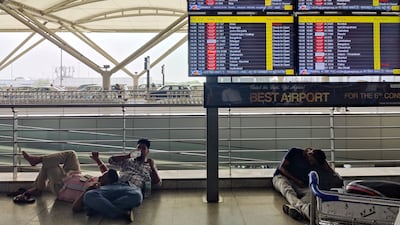Flights to and across the Middle East are being cancelled, delayed or rerouted due to the Israel-Iran war, and travellers may be left uncertain about whether their trips will proceed as planned. While airlines will each have their own policies for handling such situations, there are steps passengers can take to reduce the chances of getting caught off-guard.
If you have a flight in the coming weeks, here’s a checklist of things to consider before heading to the airport:
1. Check airline status
Start by visiting the airline’s official website or app and looking up your flight number. This will show whether the flight is on schedule, delayed or cancelled. Most airlines also allow passengers to sign up for real-time flight status notifications via email, SMS or in-app alerts – a useful way to know about any last-minute changes. Make sure that all contact information is up to date to avoid missing important updates.
2. Check departure and arrival airport alerts

Travel disruptions can also come from the airports themselves. Go to the websites of both the departure and arrival airports to look for travel advisories, airspace closures or terminal changes. Some airlines and airports post updates on their social media faster than their official sites, so it’s worth checking verified accounts as well.
3. Check with your embassy or foreign ministry
Government advisories are helpful during times of conflict. Check your country’s embassy or foreign ministry website for travel warnings, no-fly zones or entry restrictions. In some cases, a government may suspend flights or recommend alternative travel routes.
4. Contact the airline or travel agent directly
If unsure about the status of a flight or the available options, you can call or message the airline directly. If booked through a third-party platform, reach out to them to see if rebooking or refunds are possible. Some agents may also help arrange alternate routes if an original flight is cancelled.
5. Pack essentials in your carry-on

Prepare for the possibility of long delays or unexpected overnight stays. Carry-on bags can include items such as prescription medications, a phone charger, basic toiletries, snacks and a change of clothes. This ensures not being caught unprepared if checked baggage is delayed or access to it is restricted.
6. Check airport access and transit connections
Even if a flight is operating, getting to the airport might not be so straightforward. Confirm that roads are open and ground transport is available. If transiting through another country, double-check that the connection is still valid and hasn’t been cancelled due to shifting airspace restrictions.
7. Monitor trustworthy news sources
Beyond your airline and airport, stay informed by following reputable news outlets. Conditions can change quickly in a volatile region, and being aware of the latest developments can help inform travel decisions.
8. Have a backup plan

In unstable situations, having a plan B is crucial. Research alternative flights or airlines that use different routes and consider adjusting travel dates if necessary. Also look into travel insurance that covers cancellations and delays due to conflict or geopolitical events. It’s also a good idea to carry some local currency and make sure credit cards are working, in case there's a need to book last-minute accommodation or transport.
9. Download airline and airport apps
Apps can often be the fastest way to receive updates and make changes to bookings. In many cases, rebooking a flight or claiming a voucher can be done through the app without needing to wait on hold.
10. Know your rights
Take a moment to review the airline’s cancellation and compensation policy. Depending on the carrier and location, passengers may be entitled to refunds, accommodation or meal vouchers if their flight is cancelled or delayed.




